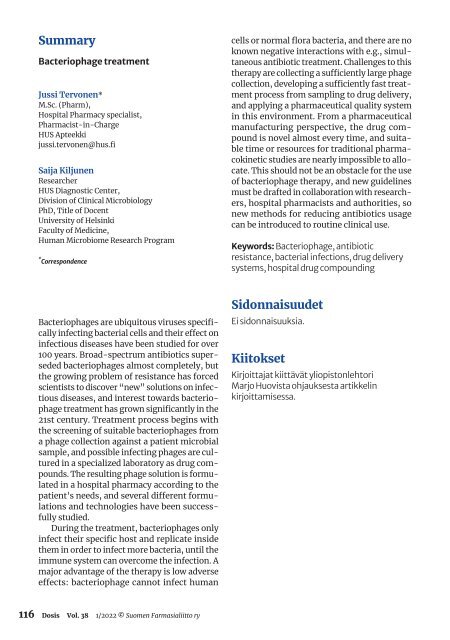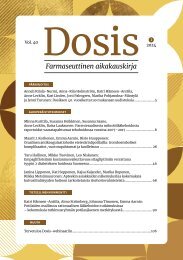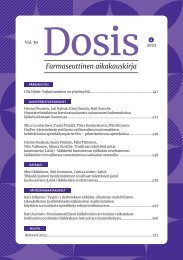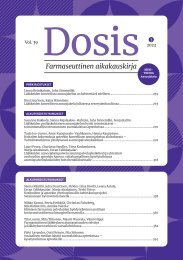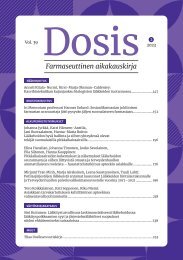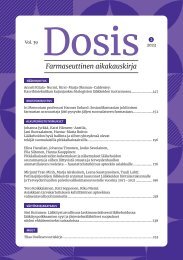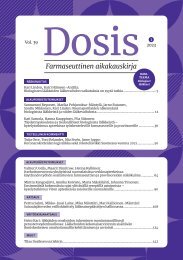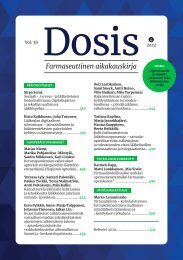DOSIS 1/2022
Farmaseuttinen aikakauskirja DOSIS 4/2021 vol.37 5uomen Farmasialiitto ry
Farmaseuttinen aikakauskirja DOSIS 4/2021 vol.37 5uomen Farmasialiitto ry
You also want an ePaper? Increase the reach of your titles
YUMPU automatically turns print PDFs into web optimized ePapers that Google loves.
Summary<br />
Bacteriophage treatment<br />
Jussi Tervonen*<br />
M.Sc. (Pharm),<br />
Hospital Pharmacy specialist,<br />
Pharmacist-in-Charge<br />
HUS Apteekki<br />
jussi.tervonen@hus.fi<br />
Saija Kiljunen<br />
Researcher<br />
HUS Diagnostic Center,<br />
Division of Clinical Microbiology<br />
PhD, Title of Docent<br />
University of Helsinki<br />
Faculty of Medicine,<br />
Human Microbiome Research Program<br />
* Correspondence<br />
cells or normal flora bacteria, and there are no<br />
known negative interactions with e.g., simultaneous<br />
antibiotic treatment. Challenges to this<br />
therapy are collecting a sufficiently large phage<br />
collection, developing a sufficiently fast treatment<br />
process from sampling to drug delivery,<br />
and applying a pharmaceutical quality system<br />
in this environment. From a pharmaceutical<br />
manufacturing perspective, the drug compound<br />
is novel almost every time, and suitable<br />
time or resources for traditional pharmacokinetic<br />
studies are nearly impossible to allocate.<br />
This should not be an obstacle for the use<br />
of bacteriophage therapy, and new guidelines<br />
must be drafted in collaboration with researchers,<br />
hospital pharmacists and authorities, so<br />
new methods for reducing antibiotics usage<br />
can be introduced to routine clinical use.<br />
Keywords: Bacteriophage, antibiotic<br />
resistance, bacterial infections, drug delivery<br />
systems, hospital drug compounding<br />
Bacteriophages are ubiquitous viruses specifically<br />
infecting bacterial cells and their effect on<br />
infectious diseases have been studied for over<br />
100 years. Broad-spectrum antibiotics superseded<br />
bacteriophages almost completely, but<br />
the growing problem of resistance has forced<br />
scientists to discover “new” solutions on infectious<br />
diseases, and interest towards bacteriophage<br />
treatment has grown significantly in the<br />
21st century. Treatment process begins with<br />
the screening of suitable bacteriophages from<br />
a phage collection against a patient microbial<br />
sample, and possible infecting phages are cultured<br />
in a specialized laboratory as drug compounds.<br />
The resulting phage solution is formulated<br />
in a hospital pharmacy according to the<br />
patient's needs, and several different formulations<br />
and technologies have been successfully<br />
studied.<br />
During the treatment, bacteriophages only<br />
infect their specific host and replicate inside<br />
them in order to infect more bacteria, until the<br />
immune system can overcome the infection. A<br />
major advantage of the therapy is low adverse<br />
effects: bacteriophage cannot infect human<br />
Sidonnaisuudet<br />
Ei sidonnaisuuksia.<br />
Kiitokset<br />
Kirjoittajat kiittävät yliopistonlehtori<br />
Marjo Huovista ohjauksesta artikkelin<br />
kirjoittamisessa.<br />
116 Dosis Vol. 38 1/<strong>2022</strong> © Suomen Farmasialiitto ry


